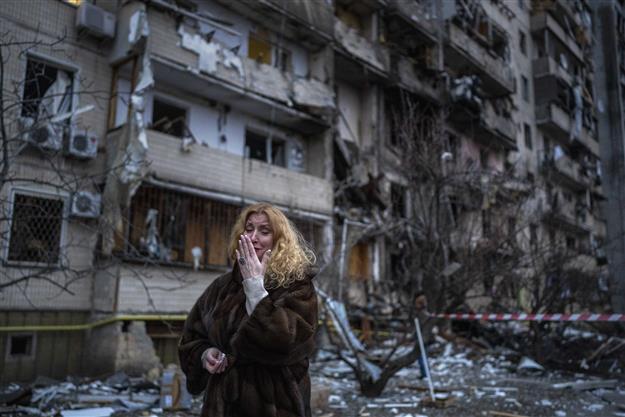By Brian Ly | Copy Editor

Since Russian President Vladimir Putin’s declaration of a “special military operation” on February 24, Ukraine has been subject to a widely condemned invasion. Despite resistance from Ukrainian forces, documented war crimes, and heavy economic sanctions, cities remain under siege without a clear opportunity for peace.
While Russia continues to focus on Ukraine’s capital, Kyiv, it is also involved in the missile shelling and attacks on numerous other cities within the country. The port city Mariupol has been under siege as a priority target for Russian troops for months as civilians and soldiers find refuge in the Azovstal steel plant.
Ukrainian President Volodymyr Zelenskyy called on Russia to commit to longer cease-fires that would allow civilians to be evacuated throughout the country, and especially at the steel plant where conflict continues to occur.
However, peace talks between the two leaders have widely fallen apart without much progress.
“We are ready to conduct these negotiations, these talks, as long as it is not too late,” Zelenskyy stated in a virtual address on May 11.
Instead, Missile shelling and military troops continue to target civilian residencies and public spaces despite Russia’s insistence on focusing on only key military targets. As a result, the invasion has brought about concerns of war crimes being committed by Russian forces.
Ukrainian officials called for an investigation into potential war crimes being committed by Russian troops after a released surveillance video showed soldiers shooting two unarmed civilians near Kyiv on May 11. The video was obtained and verified by CNN.
Amnesty International also released an investigative report on April 7 detailing interviews with Ukrainian civilians and reviewing material evidence, with plans to use the document for future prosecutions.
“The pattern of crimes committed by Russian forces that we have documented includes both unlawful attacks and wilful killings of civilians,” said Agnès Callamard, Amnesty International’s Secretary General, in the report. “It is vital that all those responsible, including up the chain of command, are brought to justice.”
The crimes include unlawful airstrikes, extrajudicial executions, and torturing of civilians. Ukrainian officials, joined by organizations such as the UN, Human Rights Watch, and La Strada Ukraine, have also been documenting the prevalence of sexual violence throughout the invasion.
“The cases we documented amount to unspeakable, deliberate cruelty and violence against Ukrainian civilians,” stated Hugh Williamson, Europe and Central Asia director at Human Rights Watch, in an early April report. “Rape, murder, and other violent acts against people in the Russian forces’ custody should be investigated as war crimes.”
While Ukraine’s western allies have made the decision to not send military forces into the country, they have aimed to support the country through sending military supplies, humanitarian aid, and discouraging Russia through heavy economic sanctions that aim to harm the country’s economy and wealthy individuals.
Of the largest sanctions currently being proposed, the European Union (EU) has suggested phasing out the usage of Russian crude oil over the next six months and refined fuels by January, despite the reliance of Russian energy in many European countries. The proposal is part of the broader sixth package of sanctions made by the EU, which also targets wealthy Russian individuals, Russian news outlets, and moving to remove Russia’s largest banks from the Society for Worldwide Interbank Financial Telecommunication (SWIFT) payment system.
If passed, these sanctions would further isolate Russia from international trade at the cost of potentially worsening the energy crisis in Europe. However, Hungary, which is both pro-Russian and heavily reliant on Russian energy, has objected to the ban, stalling the sanctions package.
